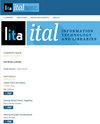管理图书馆的图书指南
IF 1.3
4区 管理学
Q3 COMPUTER SCIENCE, INFORMATION SYSTEMS
引用次数: 0
摘要
本文讨论了 William G. Squires 图书馆如何对其 LibGuides 进行可用性研究,以确定学生的设计偏好。研究结果支持了之前关于图书指南制作最佳实践的研究。本文深入探讨了以图书馆员为中心的设计是如何阻碍学生取得成功的,并就如何更好地开发以学生为中心的模板设计提供了建议,这种模板设计可以在所有指南中提供一致性并提高用户的熟练程度。本文章由计算机程序翻译,如有差异,请以英文原文为准。
Managing Your Library’s LibGuides
This paper discusses how the William G. Squires Library conducted a usability study on their LibGuides to identify student design preferences. The results of the study support previous research concerning best practices for LibGuide creation. This paper offers insight into how librarian-centric design hinders student success and provides suggestions for how to best develop a student-centric template design that offers consistency and increased user proficiency across all guides.
求助全文
通过发布文献求助,成功后即可免费获取论文全文。
去求助
来源期刊

Information Technology and Libraries
管理科学-计算机:信息系统
CiteScore
2.90
自引率
5.60%
发文量
25
审稿时长
1 months
期刊介绍:
Information Technology and Libraries publishes original material related to all aspects of information technology in all types of libraries. Topic areas include, but are not limited to, library automation, digital libraries, metadata, identity management, distributed systems and networks, computer security, intellectual property rights, technical standards, geographic information systems, desktop applications, information discovery tools, web-scale library services, cloud computing, digital preservation, data curation, virtualization, search-engine optimization, emerging technologies, social networking, open data, the semantic web, mobile services and applications, usability, universal access to technology, library consortia, vendor relations, and digital humanities.
 求助内容:
求助内容: 应助结果提醒方式:
应助结果提醒方式:


